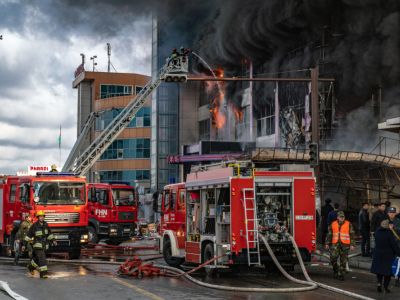Pakistan has begun planning for an influx of more than one million refugees from Afghanistan as terrified citizens flee in fear of a massive US attack, aid sources told AFP on Friday.
Contingency plans, which have not been made public, envisage the establishment of camps between the southwestern city of Quetta and the border with the ability to house 500,000 new arrivals, the sources said.
Authorities in North West Frontier Province (NWFP) confirmed on Thursday they had finalized plans to reopen 80 former refugee settlements with the capacity for 800,000 people.
The UN High Commissioner for Refugees (UNHCR) estimates that at least 15,000 Afghans have crossed into Pakistan in the last week, despite Islamabad's attempts to close its long and porous border and some forced repatriation.
The refugee agency has made provisions for that total reaching 100,000 in the coming days. A 25-strong rapid response team including health, legal and security experts was being rushed to Pakistan, along with 20,000 tents, 60,000 blankets and other emergency supplies, spokesman Yusuf Hassan told AFP.
He said a much bigger exodus over the coming weeks and months appeared inevitable, given the prospect of a new military conflict to add to Afghanistan's existing crises of civil war, chronic food shortages and drought.
"During the [1979-89] Soviet occupation, millions of Afghans came into Pakistan and there were not the problems of drought and a collapsed infrastructure that we have now," Hassan said.
"The people are very weak now. It only takes a little push and a lot of them will go."
Recent refugee arrivals in Pakistan, which already shelters more than two million long-term Afghan refugees, have been concentrated in Baluchistan, the province around Quetta.
The length of the border and the desert terrain make it easier for refugees to sneak through there than in the mountainous north.
Many refugees arriving at the main border crossing of Chaman are from the nearby Afghan city of Kandahar, the stronghold of the ruling Taliban and main base of alleged terrorist Osama bin Laden.
With the city seen as being at the top of a target list for US reprisal strikes, half its population, some 100,000 people, have fled, according to the UNHCR -- ISLAMABAD (AFP)
© 2001 Al Bawaba (www.albawaba.com)









